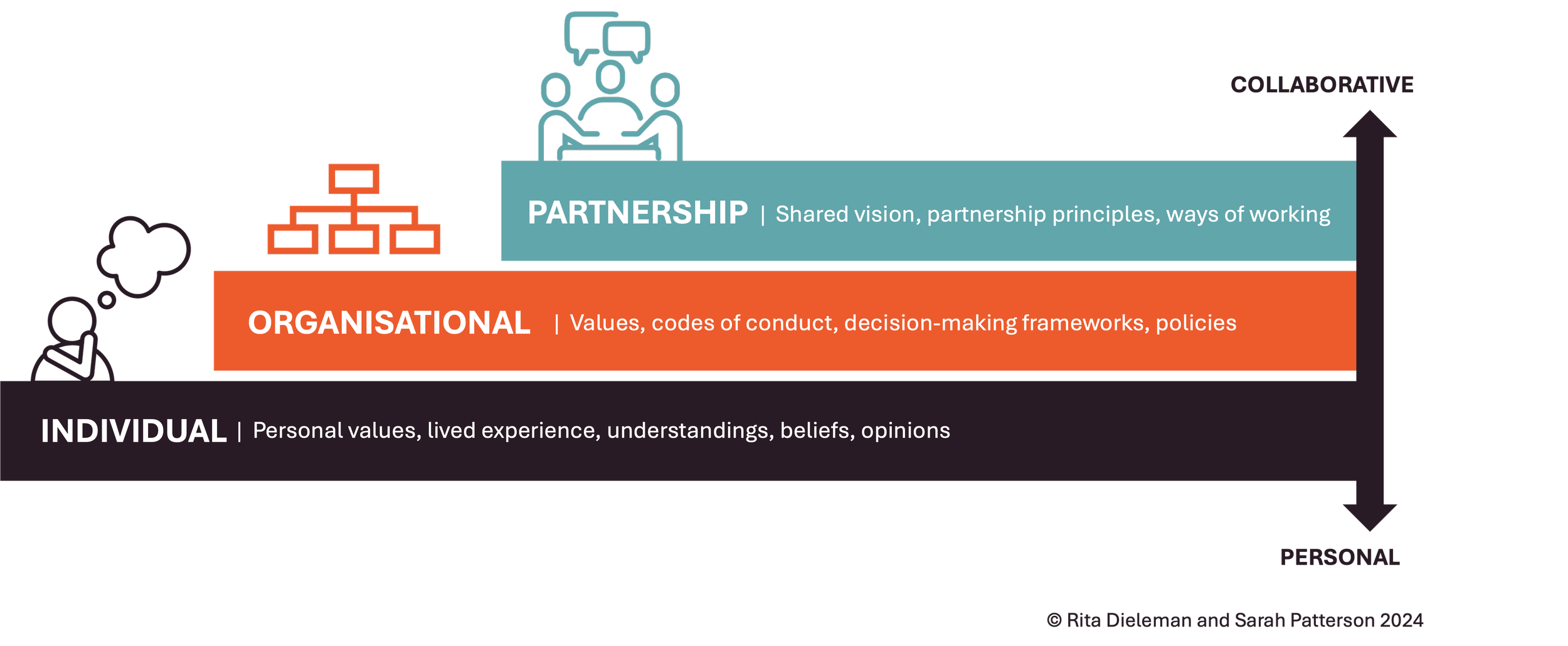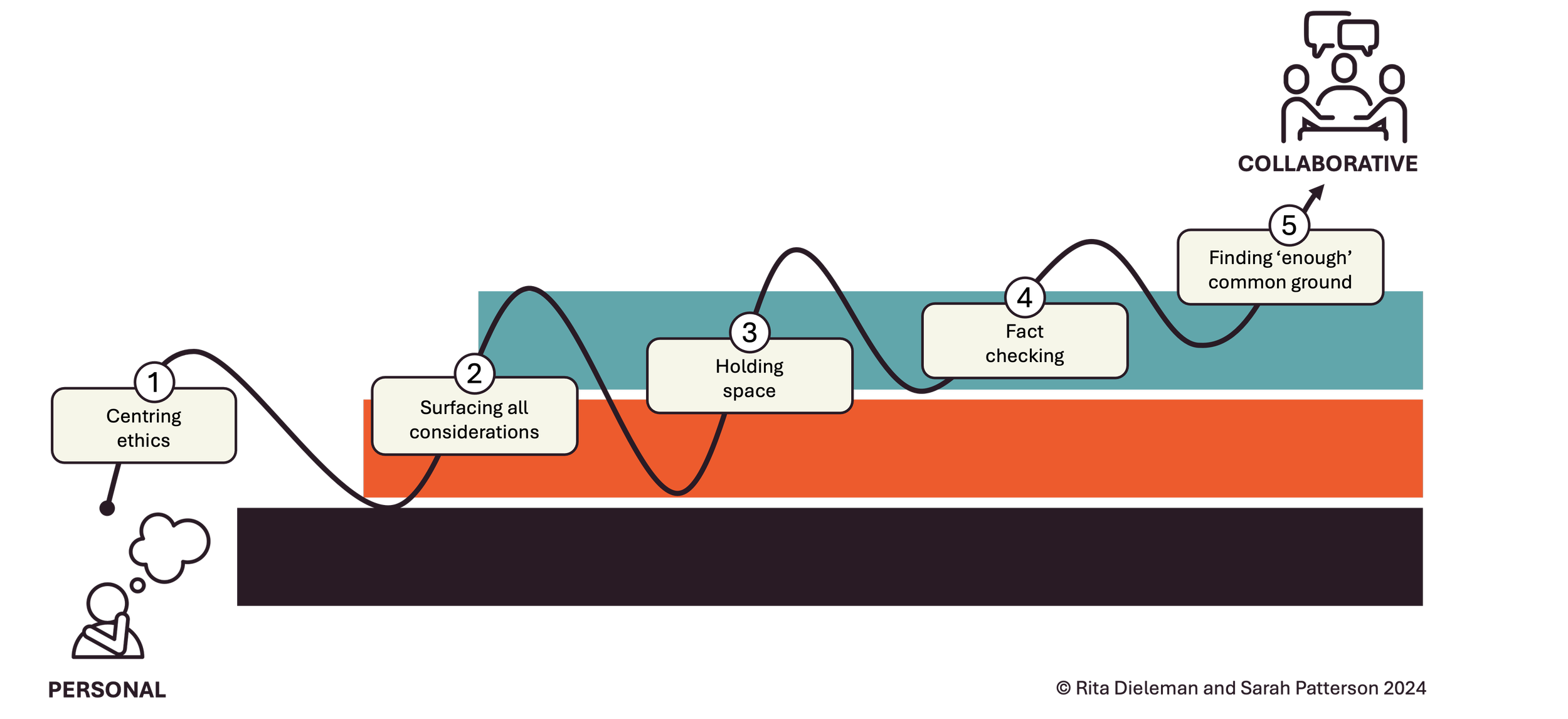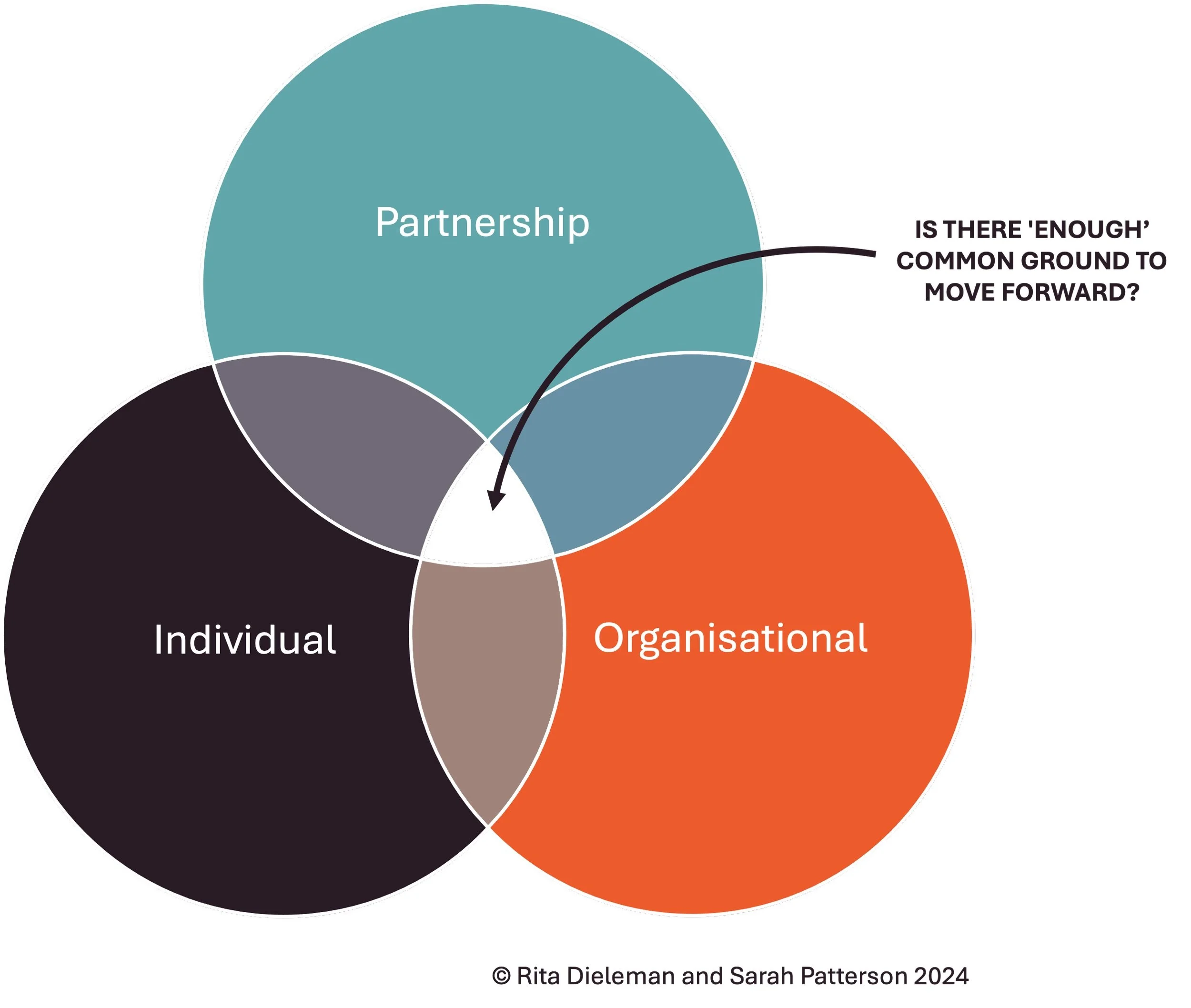From the personal to the collaborative: how partnership brokers can bring value when navigating ethics
We are not ethics experts. We are partnership brokers who come across ethics every day. In our personal lives, in our working environment, and in society. Each of us from time to time has to deal with our own ethical dilemmas as brokers. And we find ourselves sometimes struggling with how to relate to ethics in our professional role, as it is a subject that is so close to our hearts. A few months ago we started exchanging ideas, experiences and viewpoints, and we held a conversation cafe with other brokers around the subject, helping us understand we are not alone in our struggle.
As we reflected and worked together on the subject, we felt that more could be done in the field of brokering around ethics. Therefore we wanted to share what we have learned so far and see how that resonates with you as fellow-brokers and/or practitioners in partnerships.
In part one of this article we share what we have learned along the way about:
the many different layers involved when navigating ethics in partnerships: the personal, the organisational and the partnership level, and
the challenge for brokers of the principle of ‘impartiality’ when navigating ethical dilemmas
Part two outlines how brokers can bring value in supporting partnerships to find ‘enough’ common ground to move forward despite ethical challenges.
But first, what is ethics?
Ethics is a part of philosophy that deals with the critical observation of human behaviour, asking questions around the fundamentals of morality, when are actions ‘right’ or ‘wrong’, and what moral duties we have as human beings towards others. These questions do not only apply to individuals but also to groups of friends, organisations, countries and partnerships. What is considered ‘ethical’ varies from country to country, culture to culture and person to person.
So what does that mean when we work in partnerships? And how can partnership brokers support partners when navigating ethics?
Part 1: The layers of ethics in a partnership
Ethics can present in many different aspects of a partnership, but we tend to navigate them within three distinct layers: Personal, Organisational, Partnership. Each layer is of equal importance when considering ethics in partnerships, so let’s take a closer look.
The personal layer of ethics
Ethics come close to people’s hearts and identities because it is about ‘right’ and ‘wrong’. Therefore conversations about ethics are likely to stir up (intense) emotions with yourself and others. The personal layer of ethics consists of our personal values and beliefs, lived experiences, understandings and opinions. This layer will inevitably surface within partnerships in some form or shape.
As partnership brokers, we are not representing one of the partners, we facilitate the process between them. When navigating interests, perspectives and goals in partnerships we are trained, as brokers, to take a ‘neutral’ stand - expected to be impartial. When it comes to ethics, the notion of ‘impartiality’ is not so straightforward. That is because our own beliefs and values will surface as much as those of the partners. Dynamics around ethics on a personal level influence how we will behave in a partnership, whether we are a broker or one of the partners. Subsequently, this is the layer where a lot of ethical dilemmas for partnership brokers arise. What happens for example when we:
agree with a partner because of our own ethical standpoint? Do we feel it is ok to side with them?
are frustrated and angry because we feel like we can’t say what we believe but the partnership is challenging our own ethical stances?
Our positioning as partnership brokers will depend on how we approach ethics. While this is not exhaustive, there are a few ways to consider ethics:
Moral relativism - if we consider ethics to be personal, we will say there are no universal moral truths; what is considered ‘wrong’ in one culture or context, can be ‘right’ in another. That means that as brokers, we can bring in our own moral convictions, while acknowledging those of others, without agreeing to one moral standard.
Utilitarianism - if we consider ethics from a ‘common good’ viewpoint, we will say that something is ethical if it leads to the best outcome for most people. As partnership brokers, we might focus on the ‘greater good’ for all partners based on the actions taken by the partners together.
Deontology - if we consider ethics as moral obligations and duties based on underlying moral rules that apply to all, as brokers we might focus on the moral rules or obligations such as ‘honesty’ or ‘transparency’ that have been agreed upon by all partners, even if we personally have other moral rules.
No matter which positioning we take, partnership brokers can never really be impartial when it comes to navigating ethics. So we need to:
have an awareness of our own ethical stances, knowing that our characteristics and personal convictions will be part of the brokering process
acknowledge that impartiality may not always be possible in matters of ethics, and
know when to be transparent and disclose our stances - particularly if it is likely to impact the group dynamic in partnerships.
The organisational layer of ethics
The organisational layer of ethics consists of things like organisational values, policies such as codes of conduct, frameworks and (governance) policies. When navigating ethics in partnerships, we will come across this layer quite quickly and it is generally (but not always) the most visible layer of ethics.
When looking at ethics in organisations, we see some common ethical principles that are often described and on which policies and frameworks are built, such as:
Honesty and integrity: as a foundation of trust between organisations and all groups of people that are involved with them including clients, partners and employees.
Social responsibility: the contribution of organisations to society, how they relate with communities and about the environment.
Transparency: being open and accountable to all involved about processes and how decisions are made.
Good governance: how an organisation is led and structured to avoid corruption, and abuse of power and to stimulate mutual accountability
Within this layer, brokers can start to appreciate the commonalities or differences in ethical approaches across the partnership. This can serve as a useful indication of how much effort or focus should be brought to conversations on ethics in the scoping and building phases of the partnership.
The partnership layer of ethics
Ethics in the partnership centre around what partners jointly believe in and stand for (or conversely stand against). While they do not always represent a position reached through consensus, these are the ethical boundaries that are ‘good enough’ to allow partners to effectively collaborate.
Much of the groundwork in establishing and maintaining these boundaries is laid during the formative stages of a partnership and contained within key artefacts such as the shared vision, partnership principles and agreed ways of working. Some partnerships will choose to develop a shared ethical framework.
So how can partnership brokers offer value to partnerships in navigating these layers of ethics, particularly when ethical dilemmas surface?
Part 2: Moving from the individual to the collaborative
While the diagram above looks relatively straightforward, navigating ethics as a broker is far from it. It’s a process of moving backwards, moving forward and doing roundabouts - exploring all considerations from the personal to the collaborative. Brokers offer much value in supporting partners to navigate the layers of ethics and reach enough common ground to enable collaboration. We’ve distilled our collective experience of what works down to five key steps:
Centering ethics in the conversation
Surfacing and acknowledging all considerations
Holding space for safe and robust conversation
Fact-checking assumptions and expectations
Finding ‘enough’ common ground
Step 1: Centering ethics in the conversation
As partnership brokers, we have a unique perspective on the partnership that offers insight into the dynamics at play that individual partners cannot see. Even so, ethical dilemmas can be difficult to spot - often presenting themselves as silence or withdrawal (by one or more partners), inaction or unexplained conflict.
Brokers can help partners to surface and move through ethical dilemmas by centring ethics in the conversation - introducing ethics and acknowledging the layers of ethics that exist - ideally in the early (scoping and building) phases of the partnership and in conjunction with the formulation of visions, principles and ways of working.
This step is not about arriving at what is ‘right’ or ‘wrong’, but about opening the space for safe dialogue about ethics. Just as we do when we work with partners to map the stakeholders or the power models, in this step we can also choose to bring awareness and curiosity to possible ethical considerations.
Step 2: Surfacing and acknowledging all considerations
Now we dive a level deeper - extending the exploration of ethics further by asking each partner how they ensure they align with their organisational values and how ethics factor into their organisational interests and decision-making. Likely, they’ll already have some kind of internal framework or policy that deals with ethics.
As brokers, we can check what the moral boundaries are with each of the partners, and how they consider their own moral agency: do they consider themselves entities that can be held responsible for their actions? If so, what does that accountability look like? Do they have manifests, ethical frameworks or codes of conduct that show how that accountability looks in practice? And how can the moral boundaries of one partner be matched with that of the others? As brokers, we support the process with partners on what common points and areas of difference are.
There might be common ethical principles that partners share, such as honesty, integrity, social responsibility, good governance. Common areas of difference might be how the partners approach inclusion, environmental stances, political perspectives, cultural beliefs and norms and business models and the degree of flexibility on what is / isn’t acceptable. Defining these areas of commonality and difference can help the parties involved to set and clarify their joint ethical boundaries.
One way to practically support the partners is to bring these commonalities and differences into one view and decide together how to address them. Some scenarios that might apply here are:
All partners have some kind of ethics framework and we help them agree that this partnership will consider each with equal weight or adopt a more tailored framework that brings together parts of each.
Some but not all partners have an ethics framework and we help them agree that this partnership will adopt one or an adaptation of several.
None of the partners have an ethics framework but we help them to work early to bring common ethical considerations together for use in the partnership.
Having the mechanisms to address group ethics supports the group to effectively align around the core intentions when ethical dilemmas arise, facilitating transparent and effective decision-making and ensuring conversations remain focussed at the meta, not the individual level.
Step 3: Holding space for safe and robust conversation
Brokers are accustomed to ‘holding space’ in partnership processes; a safe environment where partners can work through their perspectives together to find common ground. Especially since intense emotions can come into play in conversations around ethics, this is immensely important to do.
As brokers, we create safe spaces for robust discussion and consideration of a range of perspectives when big decision points arise in the partnership process by:
holding tension and emotion through mediums like facilitation techniques, empathy building and challenging the status quo where needed to help the group move forward
bringing awareness to, and actively addressing power imbalances within the group by holding partners firmly to the principles they have set around their behaviours to each other - being respectful, listening to hear, remaining curious etc
utilising agreed ethical frameworks or other models to inform discussions, consensus-building and decision-making - for example: IDEO’s Desirable, Viable, Feasible Design Thinking model.
Step 4: Fact-checking assumptions and expectations
After the partners have worked through possible tensions when discussing commonalities and differences in moral boundaries, it is important to go back to the table. As brokers, we can help partners fact-check assumptions and expectations, sharing our observations and presenting our evidence back to the group. This is the place where as brokers we help the group reflect on the journey so far, see if there are still outstanding issues and check that partners are moving beyond the collective ‘sum of parts’ to the collaborative: an expression of the parts they each uniquely bring that enables the partnership to deliver value.
Step 5: Finding ‘enough’ common ground
As partnership brokers, we know it’s time to move forward when all partners agree that there is ‘enough’ common ground to open the door to effective collaboration.
In this final step, the broker's role is to support partners in finding and articulating the ethical standpoints that overlap sufficiently to facilitate collaboration. In doing so, it’s important to acknowledge that in any other context, one or more partners or individuals may have chosen to pursue a particular moral or ethical position much more rigorously, even hijacking the entire conversation or process. Brokers can help to document the moral boundaries the partners have set together for the collaboration so it can be shared with those involved and understood by those outside the partnership too.
If at this point we’re unable to reach enough common ground - it may mean going back to steps two and three to surface any underlying considerations or to redefine the vision, principles or ways of working for the partnership now that new ethical constraints have been discovered. Remember this is not a linear process, but an iterative journey.
Journeying from personal to collaborative ethics requires bravery and self-awareness
Ethics do and should exist in all of their complexity and our role as partnership brokers is to champion this complexity, not shy away from it. We are now not only more aware of the fact that we are not impartial as partnership brokers when it comes to ethics; we embrace that fact.
It takes a lot of bravery to recognise our own moral boundaries and to stare into the face of unexpected outcomes. But it can also be very rewarding to go beyond the commitment of partnership principles and what theoretically works, into the very personal. If we don’t dare to step into this space, we risk an increasingly polarised world - where individuals and organisations get ‘locked in’ to their differences and fail to see the possibility of ‘enough’ common ground.
Surfacing tension, and facilitating safe and robust debate is a core skill set for brokers. We believe we bring immense value to and have a key role in addressing the challenges of moving from the personal to the collaborative of ethics.
We hope that by sharing our experiences and reflections we can start a new conversation on ethics in partnership brokering. Perhaps you have something to add to the steps above, or you have had an experience that gave you some additional insight on what ethics mean in a partnership context.
Below are some of the resources we found useful and inspiring along the way and we would love to hear about what you’ve found useful as well.
RESOURCES:
Partnership Brokers Association 7 Commitments to Ethical Partnership Brokering Practice remind us of the core considerations of a partnership broker.
Moral dilemmas in the boardroom: Striking the Balance in Ethical Decision Making. 2024 by Mijntje Lückerath - Rovers.
IDEO’s Desirable, Viable, Feasible Design Thinking model as a tool for navigating decisions on ‘common’ ground.
The Ethics Centre Free Course - ‘Ethics Unboxed’
Cranlana Centre for Ethical Leadership - ‘Skills to look for in ethical leaders’




